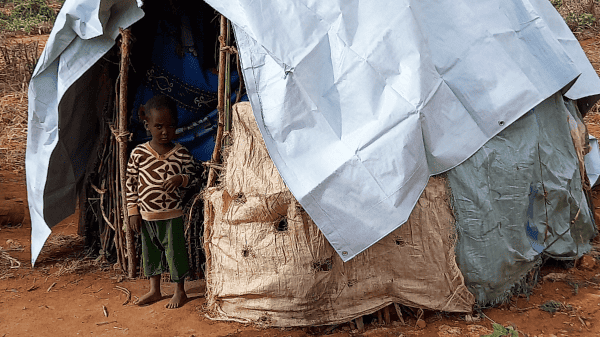How Families Build a Life in Unlikely Places
By Amanda DeWitt

Surviving in the toughest places is not easy. Daily people struggle to access the basic items they need. Wars, disasters, droughts, and other crises only make life more difficult — often forcing families from their homes with little more than the items they can carry.
Far too often families lack adequate shelter and must piece together whatever items they can find as protection from the elements. They may be unable to grow their own food due to extremely dry conditions, or they may be unable to afford basic food items at a local market due to skyrocketing prices.
Refugees, disaster victims, and many others live in places where they do not have access to a clean water source. And without adequate income they may also lack other basic items such as clothing.
In such situations lifesaving aid is essential. When put into the hands of those who are suffering, basic items express the kindness of Jesus. They help families build a better life and a brighter future. And by tangibly meeting needs, it creates opportunities for them to hear about hope.
A Tent to Call Home
Many families in the toughest places call a tent their home. Tarps are ideal as they provide better shelter from the rain, snow, and cold. They can be used as a covering or placed on the ground in wet areas. They are less flammable than other materials such as fabric or cardboard.
Most tents are about 12 to 20 square feet. It is tight living quarters for a family, but everyone works together to make sure the tent stays neat. Dishes are washed right after each meal. Sleeping mats are rolled away every morning. Laundry may be hung on a line outside of the tent and folded as soon as it is dry.
Within their small quarters, families go about everyday life. They eat meals together. Children do their homework. They wash and clean. It may be challenging at time, but many families build a life together under the shelter of a tent.
Meals to Nourish
Families need shelter from the elements. But they also need meals to nourish their bodies. Without access to proper nutrition, both adults and children quickly feel the effects. Hair loss, illness, tiredness, stunting, or wasting can result from malnutrition.
Because rice and beans or lentils are staples in many cultures, humanitarian aid organizations often rely on these items to help nourish those in need. They may also add vitamins or other nutrients to ensure recipients — especially children — receive the nutrition they need to grow and thrive.
Meals can also be tailored to the customs and tastes of those receiving them. Just a few extra ingredients or spices can make a displaced family feel more at home as they enjoy a meal in their new location. We have included a regional recipe made from simple rice and beans for you in the free activity page download below.
Water Filters to Protect from Deadly Diseases
In refugee camps, disaster areas, and other places where people lack access to clean water, a simple water filter can help save lives.
An estimated 829,000 people die every year due to preventable, water-related illnesses. Many of these are children. In developing countries people simply do not have access to clean water and sanitation services. They are forced to drink from contaminated sources and cannot practice proper hygiene.
A water filter can change that — turning dirty water into a clean source of hydration for families. It provides them with safe, clean water for drinking, cooking, washing, and more. Many water filters used in humanitarian work can last up to 10 years with proper cleaning and supply adequate water for an entire family.
Clothing to Restore Dignity
Clothing and shoes are essential for people in the toughest places. They help keep them warm in the winter and protect them from the sun in the summertime. They protect their feet as they walk along dusty roads or ragged terrain. They restore their dignity.
Little children squeal with delight when presented with clothing or a properly fitting pair of shoes. Adults too are so grateful for the gift. As people experience the kindness of Jesus through their basic needs being met, they often want to hear more about His eternal hope.
Surviving in the toughest places is not easy. But together we can help refugees, disaster victims, displaced people, and other families access the supplies they need to build a better, brighter future.
Free Download: Experience the Toughest Places
Want to learn more about how families in the toughest places survive everyday? We have created a free activity page for you and your children to explore together. Experience the Toughest Places is designed to help families, students, and vacation Bible school groups experience what daily life is like for families developing world. Download our FREE activity page today and learn more about surviving in the toughest places.
Published June 27, 2023

Amanda is a freelance writer whose work has appeared in Gift for Leadership, Kindred Spirit, and Christianity Today publications. She holds a M.A. in Media and Communication from Dallas Theological Seminary.





